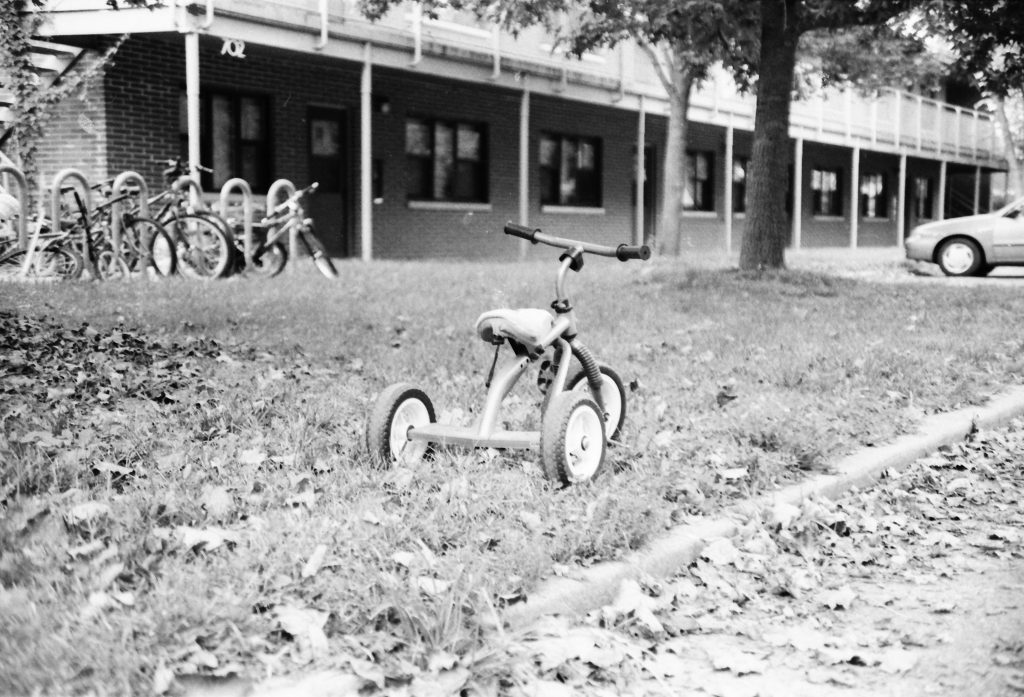Curators' Pick
Chris Alic | Transience & Memory

Chris Alic | Transience & Memory
One need not be a Chamber – to be Haunted –
One need not be a House –
The Brain has Corridors – surpassing
Material Place –
(Emily Dickinson)
The history of one who came too late
To the rooms of broken babies and their toys
Is all they talk about around here
And rebuke, did you think you’d be left out?
(Peter Straub, from Houses without Doors)
Like Mark Walton – and it’s a defining tenet of curated, I think – I also have a strong presence in my immediate and local visual arts community, with mine being Niagara : several of the artists I’ve featured here (Juliana D’Intino, for example, or Sandy Fairbairn) are ones that I’ve been lucky enough to include in a continuing curatorial project in downtown St. Catharines that began in Fall of 2022 and that is continuing indefinitely, with artists slated into late 2024.
Chris Alic is one of those artists, as her exhibition with Amber Lee Williams is currently on view at Mahtay Café & Lounge. That grew out of a 5 x 2 Visual Conversations evening (a relaxed sharing of art and ideas that I’ve facilitated for over five years, in St. Catharines and Welland). Like any good curator, I offered support to the two artists but primarily stayed out of the way, with some appropriate gentle nagging.
From that immediacy, let’s indulge some of my subjectivity that sparked my interest to consider these two pieces by Alic.
As the artist said when she spoke about the work, these are images from time she spent in Missouri in the United States – and, of late, I’ve fallen down another rabbit hole that centres upon the idea of the aesthetic of the Southern Gothic, whether that be in terms of crime or horror, but usually (and I own this) on the darker side. In light of this, the abandoned and lonely toys of Alic’s images take on a more ominous tone. Further clarification : I’ve been eschewing the ‘standard’ Southern Gothic horror of New Orleans, in my reading and research, but instead have been looking at other sites in the American South – like Charleston, or Alic’s Missouri – as these oft ignored sites have an unexplored richness in their stories that is more diverse than you might think. I also mention this – not just as another subjective indulgence – but because many of the stories I’m encountering in this enjoyable research are defined – or deformed – by the history of those sites (the institutional racism flows into the occult or supernatural horrors of the stories. There’s a story by Alan Moore about a television show that is shot on an old abandoned plantation where the filming somehow invokes the ghosts of the enslaved, and the actors ‘become’ their characters, with new manifestations of hate and racism being merged with old…all horror, they say, comes out of reality….or perhaps even the superficially banal, like Alic’s empty playground and abandoned tricycle….)
The words of the artist :
Memory is a huge part of what makes us human. Every interaction, every step, sight, sound, touch, smell – all these things create memory. But they are fragile. They are guided by perception, they are malleable, layered, are influenced by who we become, and who we become is in part made up of what we remember. Our memories continue to create us, and we create our memories. And we lose them. They fade, disintegrate, become suspect. They are subject to context, transformation and decay, and temporality, just like the spaces we inhabit and the things we use. They become the liminal space between an event and a feeling. Does emotion exist without memory?
I have been using a camera to secure my memories since I was a single-digit kid. I don’t remember ever not having a camera, or access to a camera. It was a part of my childhood, and everyone around me took photos and 8mm film of everyday life. My immediate and extended family were avid documentarians. I am continuing that tradition, but somewhere along the way I made the decision to “crop” those memories – to capture only small portions of context, little bits of an event, inexplicable to anyone but myself because each image is connected to an important moment, an emotion, a piece of who I became because of it. And then I edit. Adjust. Refine. Sometimes intentionally erase, fade, and transform them.
These seven images were made during a two-year period living in Columbia, Missouri. All were taken on a Yashica FX-70 Super 2000 film camera. I learned to use a darkroom and print my own photos with this film, and two of the images were only recently developed using caffenol-c. I had forgotten that I had taken the photos, I had forgotten the existence of the places until I saw them again.
The two person exhibition CHRIS ALIC & AMBER LEE WILLIAMS | TRANSIENCE OF MEMORY is on display at Mahtay Café & Lounge in downtown St. Catharines for the month of September, 2023.
~ Bart Gazzola